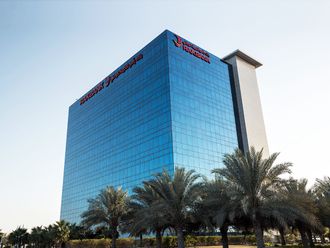London: The UK’s largest banks are coming through the immediate fallout from the nation’s vote to leave the European Union. Now they have to find a way to operate within the ensuing political vacuum that threatens to cause a business standstill.
On Tuesday, Barclays Plc disbanded an emergency committee of senior managers that was monitoring the impact from Brexit, Steve Cooper, the British lender’s chief executive for personal banking, said at a conference in London on Wednesday. Executives from Royal Bank of Scotland Group Plc, HSBC Holdings Plc and Banco Santander SA also told the conference they would turn from crisis response to managing through a period of uncertainty amid a potential economic slowdown.
“We had a crisis leadership structure in place — we stood that down yesterday, so no issues there,” Cooper said on a panel at the British Bankers Association’s retail banking conference in London. “Nothing is going to happen in the short term, there’s obviously some political uncertainty, but I’m sure that’ll work it’s way through.”
After weathering a period of wild market volatility, Britain’s lenders and global banks with key operations in London find themselves caught amid a political meltdown in Westminster and Brussels that’s already halting deals and threatening economic growth. The Bank of England held a meeting with the CEOs of the nation’s largest lenders on Wednesday to discuss the impact from the vote, according to two people briefed on the matter.
Crisis measures
Barclays held extra cash in its branches to protect against a spike in deposit withdrawals, increased the number of staff operating customer helplines, and held hourly calls between the senior executives from all the bank’s divisions to monitor the fallout from the vote, Cooper said after the panel. While the bank will watch for any unexpected incidents, having a dedicated emergency team is no longer required, Cooper said.
Britain’s second largest bank wasn’t alone preparing for the worst. Lloyds Banking Group Plc Chief Executive Officer Antonio Horta-Osorio and RBS CEO Ross McEwan told employees their contingency plans worked but the road ahead remains uncertain, according to separate memos obtained by Bloomberg News. Santander also held regular calls between top executives, put extra cash into its branches and increased staffing numbers, deputy UK. CEO Javier San Felix said on the sidelines of the conference.
While banks faced turmoil in the markets, they didn’t experience a run on deposits, which are key to their financial stability, Cooper and San Felix said. BOE Governor Mark Carney pledged last week to provide as much as £250 billion (Dh1.2 trillion, $336 billion) of funding to the financial system if needed. Carney is scheduled to deliver a further speech Thursday.
Halting declines
UK bank stocks halted their decline in the past two days, climbing an average 8 per cent, after plunging an average of 29 per cent in the previous two days. The broader FTSE 100 Index fully erased its decline since the result of the vote, while the pound is still down almost 10 per cent after rallying the last two days.
With almost a week gone by since the vote and the initial market reaction past, banks have turned their attention to what a Brexit might look like for their businesses.
The British Bankers Association organised a meeting of senior executives on Tuesday led by Shriti Vadera, chairman of Santander’s UK arm, to discuss steps to maintain financial stability and protect jobs. With the looming departure of Prime Minister David Cameron and a shake-up in government, however, it’s unclear which political leaders banks will need to approach to discuss Britain’s negotiations with Europe.












